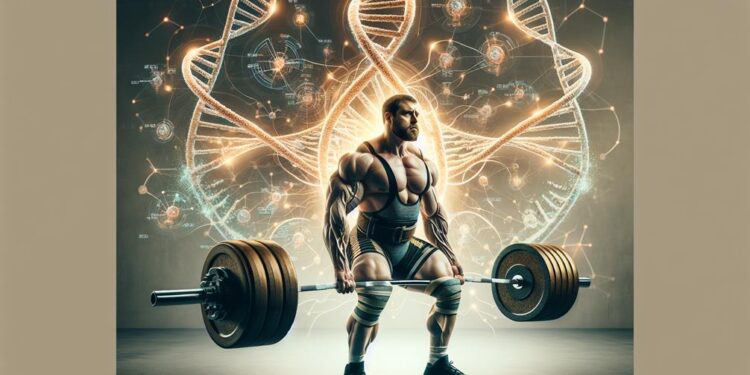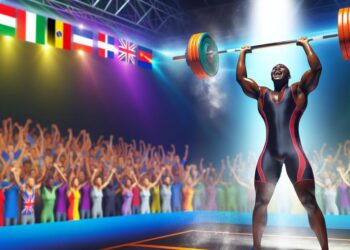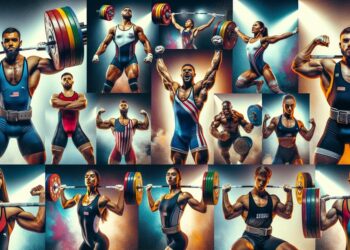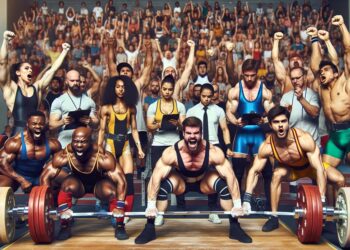When it comes to powerlifting, the difference between success and mediocrity often lies in the subtle interplay of genetics and hard work. While dedication and training are undoubtedly crucial, it is impossible to ignore the undeniable impact of genetic factors on powerlifting potential. In this discussion, we will explore the fascinating role that genetics plays in determining an individual's ability to excel in the sport of powerlifting. From muscle fiber composition to body structure and genetic factors influencing strength and power, we will unravel the complex tapestry of genetics that underlies powerlifting success. So, prepare to uncover the hidden secrets of genetic advantage and discover how to harness them for powerlifting excellence.
Key Takeaways
- Fast-twitch muscle fibers are crucial for generating explosive power and strength in powerlifting.
- Genetic variations contribute to differences in powerlifting performance among athletes.
- Genetic testing can provide valuable information about an athlete's genetic makeup related to powerlifting potential.
- Powerlifters can tailor their training strategies based on their genetic variations to capitalize on strengths and overcome weaknesses.
Muscle Fiber Composition and Powerlifting Success
The composition of muscle fibers plays a crucial role in determining an individual's success in powerlifting. Muscle fibers are divided into two main types: fast-twitch and slow-twitch. Fast-twitch fibers are responsible for generating explosive power and strength, making them essential for powerlifting. On the other hand, slow-twitch fibers are more involved in endurance activities.
Research has shown that individuals with a higher proportion of fast-twitch fibers tend to excel in powerlifting. These fibers have a greater capacity for muscle hypertrophy, which is the increase in muscle size due to resistance training. Powerlifters who have a genetic advantage in terms of muscle fiber composition are often able to achieve greater muscle hypertrophy, allowing them to lift heavier weights and perform better in competitions.
Training techniques also play a significant role in optimizing muscle fiber composition for powerlifting success. By utilizing specific resistance training protocols, such as heavy lifting and low repetitions, powerlifters can target and stimulate the fast-twitch muscle fibers responsible for generating power. Additionally, incorporating explosive movements like plyometrics can further enhance the development of fast-twitch fibers.
Body Structure and Its Impact on Powerlifting Performance
A powerlifter's body structure significantly influences their performance in powerlifting, impacting factors such as leverage and stability during lifts. Body structure refers to the skeletal frame, muscle distribution, and joint mobility of an individual. These physical attributes play a crucial role in powerlifting performance and injury prevention.
One aspect of body structure that affects powerlifting performance is leverage. Leverage refers to the mechanical advantage or disadvantage a lifter has during a lift. For example, individuals with shorter limbs and a longer torso tend to have better leverage for squatting, as they can maintain a more upright posture. On the other hand, individuals with longer limbs may have an advantage in the deadlift, as their longer arms provide a shorter distance for the bar to travel.
Stability is another important factor influenced by body structure. A powerlifter with a wider base of support, achieved through a broader hip structure or a wider foot placement, can enhance stability during heavy lifts. This stability allows for better force transfer and reduces the risk of injury.
Training techniques can be tailored to an individual's body structure to optimize performance and prevent injuries. For example, lifters with longer limbs may benefit from focusing on exercises that improve their stability, such as core strengthening and balance training. On the other hand, lifters with shorter limbs may benefit from exercises that emphasize explosive power, such as plyometrics.
Genetic Factors Influencing Strength and Power in Powerlifting
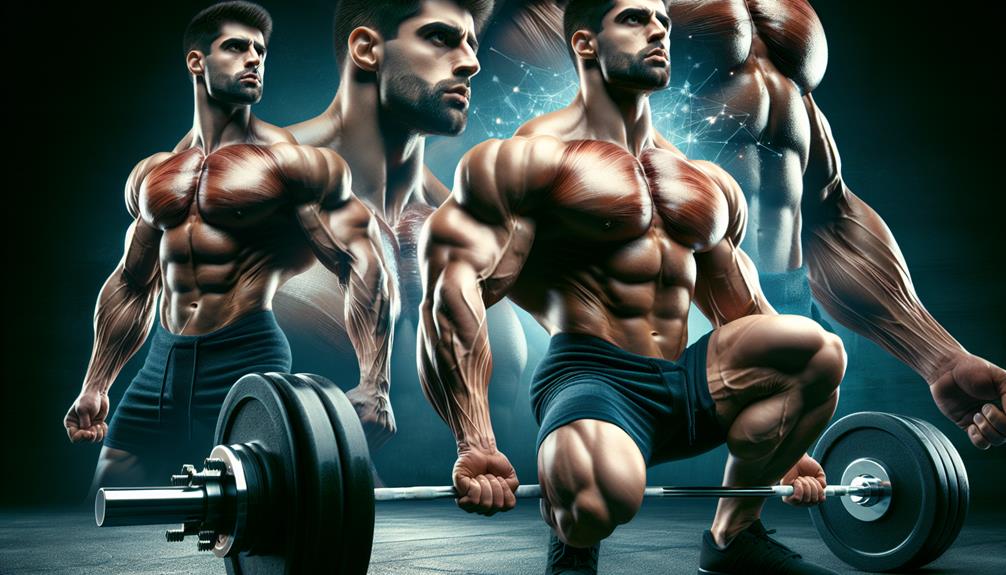
Genetic factors play a significant role in determining an individual's strength and power potential in powerlifting. Research has shown that genetic variations contribute to the differences in powerlifting performance among athletes. These genetic variations can affect muscle fiber composition, muscle size, and the body's ability to produce and utilize energy during intense physical activity.
One important aspect to consider is the heritability of strength in powerlifting. Studies have found that strength-related traits, such as muscle mass and muscle strength, have a high heritability, meaning that a substantial portion of the variation in these traits can be attributed to genetic factors. This suggests that individuals with certain genetic variations may have a natural advantage in powerlifting performance.
For example, genetic variations in the ACTN3 gene have been associated with power and strength-oriented sports. The presence of a specific variation, known as the R allele, has been linked to enhanced muscle power and an increased likelihood of success in powerlifting.
However, it is important to note that genetics alone do not determine an individual's powerlifting success. Environmental factors, training, and nutrition also play crucial roles in an athlete's performance. While genetic factors may provide a foundation for strength and power potential, it is ultimately an athlete's dedication, hard work, and training that will determine their success in powerlifting.
The Role of Genetics in Powerlifting Potential
With an understanding of the influence genetics have on an individual's strength and power potential in powerlifting, it is important to explore the role genetics play in determining an athlete's powerlifting potential. Genetic testing for powerlifting potential has gained popularity in recent years, as athletes seek to gain insight into their genetic advantages and limitations. This testing can provide valuable information about an athlete's genetic makeup, including factors such as muscle fiber composition, muscle size and strength, and the production of certain hormones that contribute to power and strength.
To paint a clearer picture of the role genetics play in powerlifting potential, consider the following nested bullet points:
- Genetic advantages:
- Certain genetic variations can result in a higher proportion of fast-twitch muscle fibers, which are responsible for explosive power and strength.
- Genetic factors can also influence muscle size and strength, allowing some individuals to naturally develop more muscle mass and power.
- Genetic limitations:
- Genetic variations can also result in a higher proportion of slow-twitch muscle fibers, which are more endurance-oriented and may limit an individual's powerlifting potential.
- Other genetic factors, such as variations in hormone production, can impact an athlete's ability to build muscle and generate power.
Understanding genetic limitations in powerlifting can help athletes set realistic goals and develop effective training strategies. While genetics certainly play a role in powerlifting potential, it is important to remember that hard work, dedication, and proper training techniques are also crucial in maximizing performance.
Harnessing Genetic Advantages for Powerlifting Excellence
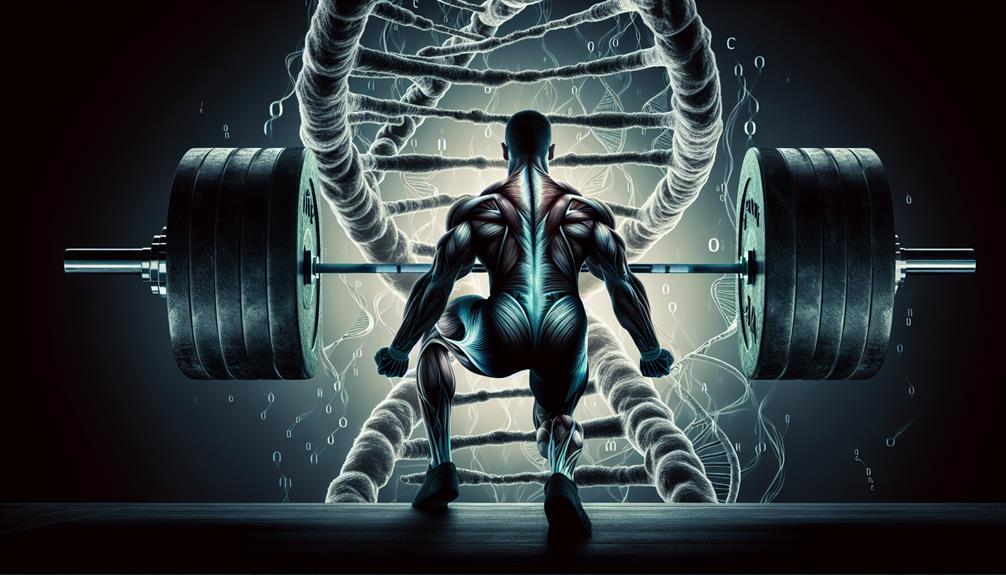
By utilizing the unique genetic advantages inherent to each individual, powerlifters can optimize their training and performance to achieve excellence in the sport. One way to identify these genetic advantages is through genetic testing. Genetic testing allows powerlifters to uncover their specific genetic variations that may affect muscle performance, strength, and recovery. By understanding these genetic variations, powerlifters can tailor their training strategies to capitalize on their strengths and overcome their weaknesses.
For example, genetic testing can reveal the presence of certain muscle fiber types, such as fast-twitch or slow-twitch fibers, which play a significant role in powerlifting performance. Powerlifters with a higher proportion of fast-twitch fibers, which are associated with explosive strength and power, may benefit from focusing on exercises that target these fibers, such as heavy squats and deadlifts. On the other hand, powerlifters with a higher proportion of slow-twitch fibers, which are associated with endurance and stability, may benefit from incorporating higher rep ranges and longer rest periods into their training.
Furthermore, genetic testing can also provide insights into an individual's response to different training stimuli. For instance, some powerlifters may have genetic variations that make them more prone to muscle damage and inflammation. In such cases, training strategies that prioritize recovery, such as active rest periods and targeted supplementation, may be beneficial.
Frequently Asked Questions
Can Powerlifters With a Higher Percentage of Slow-Twitch Muscle Fibers Still Achieve Success in the Sport?
You can still achieve powerlifting success even if you have a higher percentage of slow-twitch muscle fibers. Genetic factors, such as body fat percentage and potential, play a role. Genetic testing can predict advantageous markers.
How Does Body Fat Percentage Affect Powerlifting Performance?
Body fat percentage can impact powerlifting performance. Higher body fat levels can limit strength gains and decrease overall performance. Maintaining a lower body fat percentage can lead to better strength-to-weight ratio and improved powerlifting results.
Are There Any Genetic Factors That Can Limit an Individual's Potential for Success in Powerlifting?
Genetic limitations can play a role in powerlifting success. Factors like muscle fiber composition can affect your potential. But don't let that discourage you. With proper training and dedication, you can still achieve great results. Keep pushing!
Can Genetic Testing Be Used to Predict an Individual's Powerlifting Potential?
Genetic testing has limitations in predicting powerlifting potential. However, it can provide insight into certain genetic factors that may influence your performance. Ultimately, training and dedication play a significant role in maximizing your powerlifting success.
Are There Any Specific Genetic Markers That Have Been Identified as Being Advantageous for Powerlifting Success?
Genetic markers play a crucial role in powerlifting success. These markers, such as ACTN3 and ACE, have been identified as advantageous for powerlifters. Understanding the role of genetics in performance can help you optimize your training and reach your full potential.
Conclusion
You may think that success in powerlifting is solely determined by hard work and dedication. However, genetics play a significant role in determining one's potential in this sport. While anyone can participate in powerlifting, those with a genetic predisposition for greater muscle fiber composition, favorable body structure, and genetic factors influencing strength and power have a distinct advantage. So, next time you see a powerlifting champion effortlessly lifting massive weights, remember that their success is not just a result of their training, but also the genetic lottery they won.



